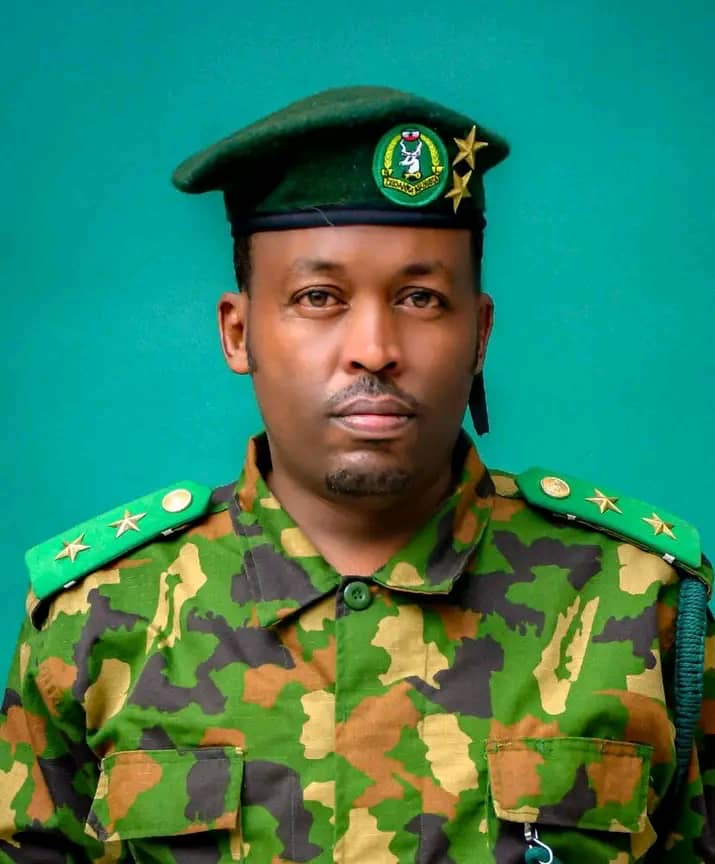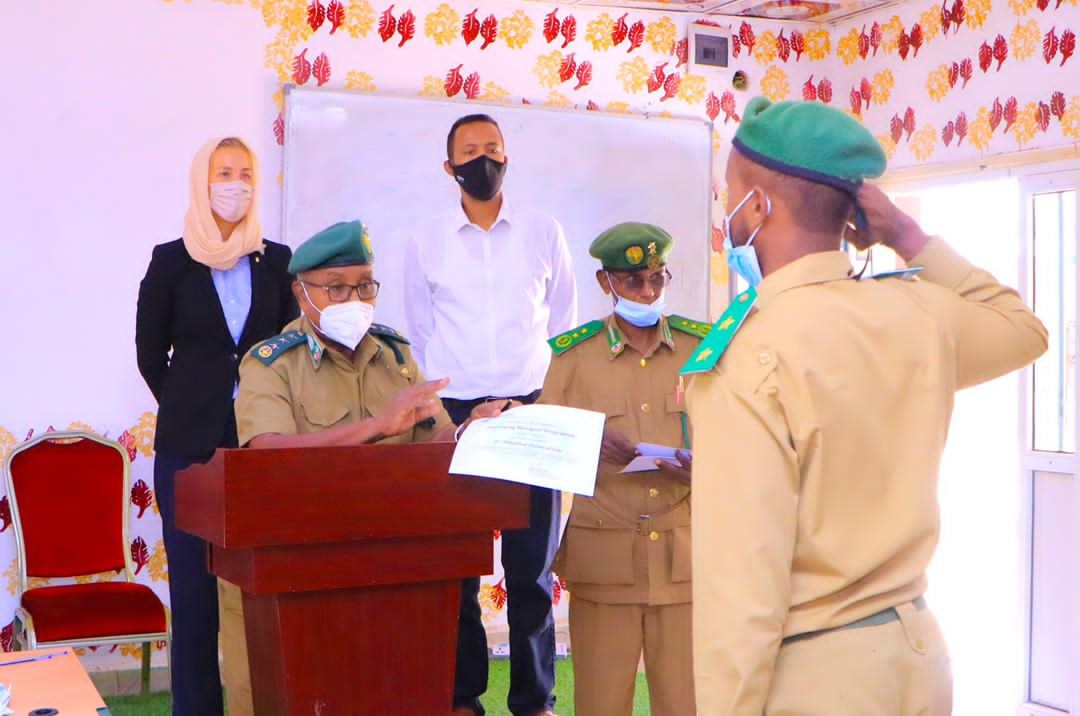UNODC Eastern Africa News and Stories
You are here: Home / News
My life as a prison officer
Under the Joint Rule of Law Programme (JROL), the United Nations Office on Drugs and Crime Global Maritime Crime Programme (UNODC GMCP) spearheads significant transformations in Somaliland's corrections service. In Hargeisa, Burao, and Gabiley, UNODC enhances prison management through staff training and inmate rehabilitation initiatives. UNODC supports the comprehensive development of the corrections service by addressing all stages of rehabilitation, from incarceration to successful reintegration into society. This not only enhances the capabilities of prison staff but also plays a vital role in transforming the corrections system, making it more effective and humane.
This initiative has equipped prison personnel with essential skills for effective inmate management, upholding human rights, and improving prison conditions adhering to the Nelson Mandela Rules, which define the humane treatment of prisoners. The various UNODC training delivered focuses on teaching staff how to treat inmates with dignity and respect, creating an environment that encourages rehabilitation and successful reintegration into society. Swedish Prison and Probation Service (SPSS) officers, seconded through a partnership with UNODC, contribute crucial expertise to these efforts. The seconded officers help design and implement comprehensive training programmes to enhance prison management, rehabilitation, and reintegration strategies. This collaboration ensures that training initiatives are grounded in global best practices, fostering sustainable improvements across Somaliland's prison system.
 My father dedicated his life to serving as a prison officer, a role that shaped our family's values and principles. His commitment and integrity left an indelible mark on me, inspiring me to follow in his footsteps. Today, as the only one in our family who has chosen this path, I carry his legacy with pride and purpose, striving to uphold the same standards of justice and compassion he embodied," said Captain Abdirhaman, an 18-year veteran of the Somaliland Prison and Probation Service, displaying his hard-earned stars. He proudly points to the second of his two stars and says, "This is for the completion of the two-year Developing Managers Program (DMP)," referring to the UNODC training implemented with the SPSS.
My father dedicated his life to serving as a prison officer, a role that shaped our family's values and principles. His commitment and integrity left an indelible mark on me, inspiring me to follow in his footsteps. Today, as the only one in our family who has chosen this path, I carry his legacy with pride and purpose, striving to uphold the same standards of justice and compassion he embodied," said Captain Abdirhaman, an 18-year veteran of the Somaliland Prison and Probation Service, displaying his hard-earned stars. He proudly points to the second of his two stars and says, "This is for the completion of the two-year Developing Managers Program (DMP)," referring to the UNODC training implemented with the SPSS.
The two-year DMP included a combination of theoretical and practical sessions at Hargeisa Central Prison, focusing on implementing the most recent advancements in inmate care following international laws. Captain Abdirahman was among 14 cadets selected for the programme. He praises the DMP programme for giving him his second star and states that the DMP opened his eyes to a whole new way of working in prisons. "The DMP allowed me to see that even as a post-conflict nation, we could still work in compliance with international standards, despite our limited resources," he elaborates on the impact of the programme, "We were encouraged in the DMP to see our work from the perspective of the needs not only of the prisoner, but the community at large. If our work is successful, we can return a rehabilitated person back to their community." The DMP has truly transformed his perspective and approach to his work.
"I also partook in phase one of the training of trainers’ course (TOT). This course was very competitive, and I was very happy to pass the interview stage”. This was a follow-on to the developing managers programme, where he had been taught how to train others in international human rights-compliant prison management. This course was particularly valuable because many of the participants did not have a background in teaching. He highlighted, “I picked up so many useful skills and learned so much and hope to be selected for phase 2."
 "I am very proud of the work we did in the prisons over the last five years. I worked in security in both Burao and Hargeisa prisons, appointed to these posts after successfully completing the two-year DMP course. As a duty officer, I was in charge of prison operations, answering directly to the prison commander. Additionally, I mentor the younger cadets, seizing every opportunity to transfer my knowledge and skills in security to new recruits. My guidance has significantly contributed to helping the cadets understand the significance of ethical conduct, making them more aware of the impact of their actions on others. By instilling these values early, I ensure that the next generation of security personnel embodies competence and compassion." He also highlights that there are many skilled UNODC-trained officers stationed in numerous prisons across Somaliland, actively involved in security, operations, and rehabilitation programs.
"I am very proud of the work we did in the prisons over the last five years. I worked in security in both Burao and Hargeisa prisons, appointed to these posts after successfully completing the two-year DMP course. As a duty officer, I was in charge of prison operations, answering directly to the prison commander. Additionally, I mentor the younger cadets, seizing every opportunity to transfer my knowledge and skills in security to new recruits. My guidance has significantly contributed to helping the cadets understand the significance of ethical conduct, making them more aware of the impact of their actions on others. By instilling these values early, I ensure that the next generation of security personnel embodies competence and compassion." He also highlights that there are many skilled UNODC-trained officers stationed in numerous prisons across Somaliland, actively involved in security, operations, and rehabilitation programs.
Captain Abdirahman is not only hopeful about a long and successful career in the Somaliland prison service; he aspires to achieve a leadership position in the future. “I would like to attain command of a prison in the next ten years. Working in the prison service has allowed me to build a career for myself. It also allows me to give back to my community through helping prisoners in their efforts to rehabilitate themselves and change their lives for the better.”
"This initiative, funded by the European Union, the governments of Sweden and the Netherlands, seeks to enhance the rule of law in Somaliland, supporting SDG 16's goal of promoting peace, justice, and strong institutions. It underscores international cooperation in fostering legal frameworks essential for sustainable development and societal stability."
For more information, please contact:
Mr. David O’Connell (David.OConnell@un.org)
Western Indian Ocean Programme Coordinator
Global Maritime Crime Programme
United Nations Office on Drugs and Crime
Click here to visit the UNODC Global Maritime Crime Programme website.